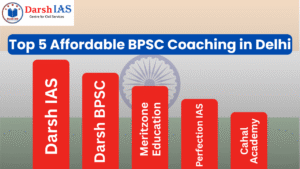How to Prepare for BPSC Prelims and Mains – Complete Guide For Aspirants
BPSC (Bihar Public Service Commission) is not an ordinary competitive exam; it is much more than just an exam. It is a gateway where some candidates get their dream job in prestigious administrative posts in Bihar. Whether your dream is to become a DSP, Deputy Collector, or serve in other high positions at the state level, the journey begins with a clear, well-developed plan, a motivated mind, and disciplined execution.
Most of the candidates who live in Delhi are still confused and depressed, even though the city offers so many opportunities for study, 24/7 highly experienced faculty guidance, self-made study material, competitive peer groups, and step-by-step guidance. But with all these options and information, most of the candidates are confused about where to start and how to approach their preparation.
In this blog, we will break down step-by-step preparation for the BPSC (Bihar Public Service Commission) Prelims and Mains.
| Table of contents |
| What is BPSC, and Important Information About BPSC? |
| Understanding the Exam Pattern and Syllabus of BPSC |
| Stage-wise Preparation Strategy for Prelims |
| Practical Scoring Oriented Plan for Mains |
| Time Management & Study Planning |
What is BPSC?

BPSC (Bihar Public Service Commission) is a state-level constitutional body of Bihar. It is responsible for recruiting officers for various levels of administrative posts, jobs like DSP, Deputy Collector, Revenue Officer, etc.
Important Information About BPSC
| Established in 1949 after India’s independence. |
| Headquartered in Patna, Bihar. |
| Selection Process: Prelims → Mains → Interview. |
Understanding the BPSC Exam Structure

Before getting admission into Institutes, and diving into books, and test series, you must know what the exam structure is.
Stage 1: Preliminary Examination (Prelims)
- Objective Type
- 150 Marks Paper (General Studies Only)
- Multiple Choice Questions
- Duration: 2 Hours
- Qualify nature – Clear the cut-off to qualify for the next exam (MAINS)
Stage 2: Mains Examination (Mains)
- Descriptive Type
- General Hindi – 100 Marks, Duration: 3 Hours, Qualifying Only
- General Studies Paper 1 – 300 Marks, Duration: 3 Hours, Merit Counting
- General Studies Paper 2 – 300 Marks, Duration: 3 Hours, Merit Counting
- Essay – 300 Marks, Duration: 3 Hours, Merit counting
- Optional Subject – 300 Marks (choose subject from list), Duration: 3 Hours, Merit Counting
Stage 3: Interview (Personality Test)
- 120 marks
- To Assess the Aspirant’s Personality, Communication Skills, Presence of Mind, etc.
Stage-wise Preparation Strategy for Prelims

Step 1: Know about the syllabus
Let’s know it about with subject-wise modules.
- Geography: Physical, Indian, and Bihar-Specific
- History: Ancient, Medieval, Modern, and Bihar Historical Role
- Economy: Indian Economy Basics – Bihar-Specific Schemes
- Polity: Constitution, Governance, Political Development
- General Science: Everyday Science, Basic Concepts
- Current Affairs: National + Bihar State Events
Step 2: Build Strong Basics
Before running into advanced books, first, strengthen your grip on the basics
- Study from NCERTs (6th–12th) for History, Geography, and Science.
- Laxmikant for Polity.
- A good GK compendium, like Lucent, for quick fact checks.
Step 3: Current Affairs the Smart Way
- Read Daily 30–40 minutes from newspapers like The Hindu or The Indian Express.
- Maintain a Bihar Current Affairs file—schemes, appointments, state budget, etc.
- Revise monthly compilations to save time before exams.
Step 4: Practice too much
- Solve 10 Years PYQ’s Daily
- Take weekly tests—don’t wait to finish the whole syllabus.
- Analyse mistakes
Step 5: Master Time Management
In the Prelims exam, accuracy is as important as speed. Practice solving 200 questions daily within 110–115 minutes.
Practical Scoring Oriented Plan for Mains

Step 1: Know Full Information About the Mains Paper
- General Hindi: Focus on grammar, comprehension, and precise writing
- GS Paper 1: Indian culture, modern history, Bihar history, geography, and freedom struggle.
- GS Paper 2: polity, economy, science & tech, and Bihar development.
- Optional Subject: Choose based on interest and availability of resources. In Delhi, coaching like Darsh IAS offers guidance for popular optional subjects like History, Geography, and Sociology.
Step 2: Develop Writing Skills Early
- Start answering writing immediately after the prelims exam preparation is stable
- Use a clear Intro—Body—Conclusion format
- Write in neat handwriting; underline the keyword to boost readability.
Step 3: Enrich Your Answers
- Use Bihar-specific data (e.g., literacy rate, poverty rate, agricultural output).
- Include maps, diagrams, or flowcharts where relevant.
- Quote government schemes and NITI Aayog rankings.
Step 4: Revise, Don’t Just Read
- First reading: Understand concepts.
- Second: Make concise, bullet-point notes.
- Third: Revise for retention and practice recalling data without looking at notes.
Step 5: Test Series is Non-Negotiable
- Join a Mains-oriented test series to simulate the exam environment.
- Darsh IAS, for instance, provides feedback that goes beyond marks—they focus on improving structure, depth, and presentation.
Time Management & Study Planning

A disciplined routine separates toppers from also-rans.
Sample Daily Routine:
- Morning: Static subjects (Polity, history, optional), Current affairs & newspaper
- Afternoon: Practice MCQs or mains answer writing, revise old topics
- Night: Light Reading (Bihar schemes, reports)
Weekly Routine:
- One full day dedicated to revision.
- Two mock tests—one for Prelims, one for Mains writing.
Conclusion
Cracking the BPSC exam is not just about hard work; it’s about working in the right direction with a Motivated mind, discipline, clarity, and consistency. From mastering the Prelims syllabus to developing writing skills for the Mains, and finally projecting confidence and administrative acumen in the Interview, each stage demands a unique approach.
For aspirants in Delhi, the abundance of quality coaching, peer competition, and study resources offers a strong advantage. Institutes like Darsh IAS further enhance this edge by providing structured guidance, personalized mentorship, and a balanced blend of online and offline learning.
With a smart study plan, regular revision, mock practice, and a focused mindset, your dream of serving Bihar in a prestigious administrative role can move from possibility to reality. Remember—BPSC is not a sprint, it’s a marathon, and every step you take in preparation is a step closer to your goal.







